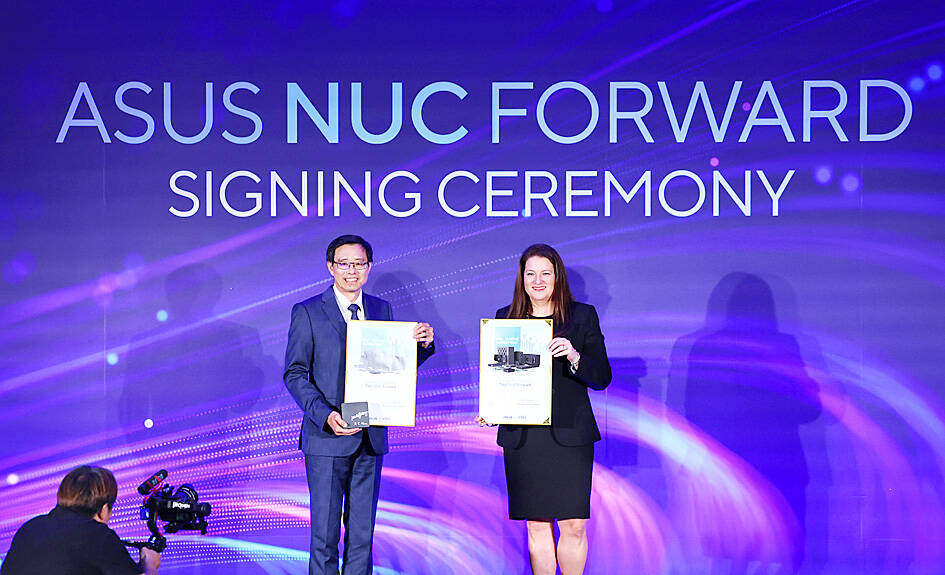Asustek Computer Inc (華碩) yesterday signed an agreement with Intel Corp to take over the US chip giant’s compact computer business, dubbed the “next unit of computing” (NUC), allowing Asustek to design, manufacture and sell Intel’s 10th to 13th-generation NUC product lines.
Asustek has created a new NUC business unit to develop future generations of NUC products and to handle Intel’s NUC clients, mostly PC vendors, Asustek said. Asustek plans to combine its existing mini-PC business with the new NUC unit, leading to a further workforce expansion to about 160 engineers at present.
Based on the agreement, Asustek does not own the exclusive right to develop and sell Intel’s NUC products. However, Asustek would have access to Intel’s NUC-related intellectual property, which is not available to other vendors of mini-PCs based on Intel’s NUC platform, the company said.

Photo: CNA
“Our established technical expertise and consistent track record in delivering industry-leading mini-PCs to customers position us perfectly to spearhead innovation and drive further growth in NUC system products,” Asustek chairman Jonney Shih (施崇棠) told a news conference in Taipei yesterday.
“I am confident that this collaboration will enhance and accelerate our vision for the mini-PC and will extend Asustek’s artificial intelligence-of-things (AIoT) and research-and-development capabilities and technology solutions.”
Asustek said it released price lists to its channel partners last month, paving the way for the PC vendor to roll out its new own-brand NUC products in January. Prior to the NUC launch, Asustek is to resell Intel-branded NUC products to assist customers through the transition period that could last for one quarter.
Intel has shipped more than 10 million Intel-based NUC products to customers around the world since the compact computer was first introduced to the market.
The latest partnership with Intel will “create synergies for Asutek,” Jackie Hsu (許佑嘉), a senior vice president and cohead of Asustek’s Open Platform and AIoT Business Groups, told reporters yesterday.
The compact PC series targets gaming PC users, and commercial and industrial users, Hsu said.
“Asustek will introduce the new NUC model to users of its ROG-brand gaming product lines,” she said.
In addition, the introduction of new Intel NUC lines would help deliver AI applications on edge devices, Asustek said. The company has established an AI team of 300 software development engineers, it said.

In Italy’s storied gold-making hubs, jewelers are reworking their designs to trim gold content as they race to blunt the effect of record prices and appeal to shoppers watching their budgets. Gold prices hit a record high on Thursday, surging near US$5,600 an ounce, more than double a year ago as geopolitical concerns and jitters over trade pushed investors toward the safe-haven asset. The rally is putting undue pressure on small artisans as they face mounting demands from customers, including international brands, to produce cheaper items, from signature pieces to wedding rings, according to interviews with four independent jewelers in Italy’s main

Macronix International Co (旺宏), the world’s biggest NOR flash memory supplier, yesterday said it would spend NT$22 billion (US$699.1 million) on capacity expansion this year to increase its production of mid-to-low-density memory chips as the world’s major memorychip suppliers are phasing out the market. The company said its planned capital expenditures are about 11 times higher than the NT$1.8 billion it spent on new facilities and equipment last year. A majority of this year’s outlay would be allocated to step up capacity of multi-level cell (MLC) NAND flash memory chips, which are used in embedded multimedia cards (eMMC), a managed

Japanese Prime Minister Sanae Takaichi has talked up the benefits of a weaker yen in a campaign speech, adopting a tone at odds with her finance ministry, which has refused to rule out any options to counter excessive foreign exchange volatility. Takaichi later softened her stance, saying she did not have a preference for the yen’s direction. “People say the weak yen is bad right now, but for export industries, it’s a major opportunity,” Takaichi said on Saturday at a rally for Liberal Democratic Party candidate Daishiro Yamagiwa in Kanagawa Prefecture ahead of a snap election on Sunday. “Whether it’s selling food or

In the wake of strong global demand for AI applications, Taiwan’s export-oriented economy accelerated with the composite index of economic indicators flashing the first “red” light in December for one year, indicating the economy is in booming mode, the National Development Council (NDC) said yesterday. Moreover, the index of leading indicators, which gauges the potential state of the economy over the next six months, also moved higher in December amid growing optimism over the outlook, the NDC said. In December, the index of economic indicators rose one point from a month earlier to 38, at the lower end of the “red” light.